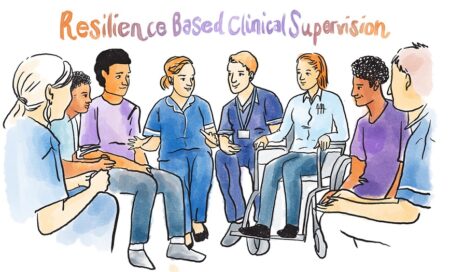Resilience-based Clinical Supervision Facilitator Resources
The Facilitator Companion
 The Resilience-based Clinical Supervision (RBCS) facilitator companion will:
The Resilience-based Clinical Supervision (RBCS) facilitator companion will:
- help you understand how RBCS works, what its underpinning values are and the evidence to support its use
- guide you through the process of RBCS, with practice activities and narrated presentations
- support you to implement RBCS in your workplace
The Animation
Printable handouts
Gemma Stacey (2022) I am reopening the debate to explore reclaiming and reframing resilience. Nursing Times. 25 October 2022. Retrieved from: https://www.nursingtimes.net/opinion/i-am-reopening-the-debate-to-explore-reclaiming-and-reframing-resilience-25-10-2022/
Gemma Stacey, Grace Cook, Aimee Aubeeluck, Beth Stranks, Louise Long, Miriam Krepa and Kate Lucre (2020) The implementation of resilience based clinical supervision to support transition to practice in newly qualified healthcare professionals. Nurse Education Today. November 2020. Vol. 94. https://www.sciencedirect.com/science/article/pii/S0260691720314143.
Gemma Stacey and Grace Cook (2019) A scoping review exploring how the conceptualisation of resilience in nursing influences interventions aimed at increasing resilience. International Practice Development Journal. Vol. 9. No. 1. https://doi.org/10.19043/ipdj.91.009
Flavia Munn (2018) Resilience-based clinical supervision model proves successful in helping nurses cope with stress. Nursing Standard. Jan 2018. Retrieved from: https://rcni.com/nursing-standard/newsroom/news/resilience-based-clinical-supervision-model-proves-successful-helping-nurses-cope-stress-126101
Gemma Stacey, Aimee Aubeeluck, Grace Cook and Snigdha Dutta (2017) A case study exploring the experience of resilience-based clinical supervision and its influence on care towards self and others among student nurses. International Practice Development Journal. Vol. 7. No. 2. https://doi.org/10.19043/ipdj.72.005.
Gemma Stacey and Aimee Aubeeluck (2017) Facilitating the Transition of Student Nurse to Registered Practitioner through the Development of Self-Care and Compassion. FoNS Blog. Retrieved from: https://www.fons.org/blogs/facilitating-the-transition-of-student-nurse/
Practice Development uses inclusive evaluation to integrate evidence from process and outcomes of transformation (Manley et al., 2021)
Getting started
You should begin to consider evaluation as part of your implementation plan. This allows you to consider what is happening in practice, what is working well and what may need to be improved on. This page has several evaluation methods for you to consider as part of your evaluation.
The aim of evaluation is to explore participants’ experience, the learning that has occurred as an outcome and the impact of this. Both qualitative and quantitative methods should be utilised for this. You may have some other specific aims within your organisation and it is essential to consider these first in order to ensure you are collating data most relevant to this.
To ensure your evaluation follows ethical guidance please seek approval and advice from your research and development department. You can also use the Health Research Authority guidance to consider your methods and whether ethical approval is required.
Context
The way the group has been organised and the wider organisational context is highly influential on the outcomes of RBCS. Therefore, your evaluation should include a vignette that describes:
- The job role of the facilitator and their previous experience in facilitating reflective practice
- The job roles of the people who are participating in the RBCS group (for example, newly qualified nurses working in the emergency department)
- The size of the group
- The consistency of group membership
- The frequency of the group meetings
- The location of the meetings
- Organisational practices that influence the implementation of RBCS (for example, challenges being released from clinical duties to attend groups)
Participatory Evaluation
The experience and learning that occurs within RBCS is best captured through discussion. As part of your regular sessions, you may wish to include a participatory evaluation session for your group. This not only supports you to evaluate the programme but also provides the participants with a learning opportunity. An example of what this may look like is below:
- Revisit the Safe Space Agreement – is there anything you may wish to change about your agreement for this session focused on evaluation?
- Grounding
- Check in
- Participants are given independent reflection time to consider the following:
- Tell us about your experience of this RBCS programme
- What aspects of this RBCS programme have been most beneficial and what impact has this had on you? (You may wish to think about your learning, support, and wellbeing)
- Were there any barriers to you attending or challenges that you experienced
- What aspects of RBCS will you take forward and how do you plan to do this?
- All participants then share and theme their reflections on these questions
- Participants could then be asked to create something that reflects the themes that they have identified (e.g. a poster, a video, a song, etc)
- Finish the session on a positive ending, this could be sharing how they have found the process.
You can find more information about participatory evaluation by reading Odell’s (2018) Reflections on developing a participatory evaluation.
For examples of a participatory evaluation for RBCS please see:
Focus Groups
Alternatively, you may wish to carry out a focus group or interview with participants. It may be useful if the group’s regular facilitator does not facilitate this part of the evaluation. Here is a suggestion for a focus group schedule that can be adapted for a one-to-one interview.
Quantitative Measure
The ProQOL V5 scale measures compassion satisfaction and fatigue associated with work. You should administer the scale before the implementation of RBCS to identify a baseline. After the group has engaged in six or more RBCS sessions you should re-administer the scale to identify if there has been a change.
You may also wish to repeat the scale after a further six months to see if the change has been sustained. It is important to work out a way of identifying your group members while enabling them to remain anonymous, so that you can track changes at each of the survey points.
While this questionnaire is available freely you should ensure that you fully credit the author, Dr Beth Hudnall Stamm, and make no changes to the scale.

